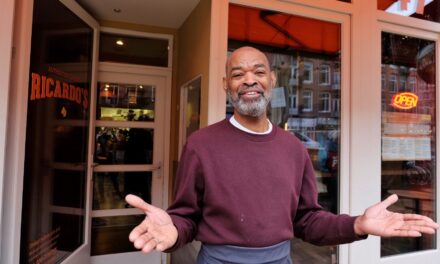With the rise of the digital age, many analogue industries have been severely disrupted. Music and TV are two prime examples of this. Nowadays, fewer people are relying on CD’s and DVD’s for their entertainment, opting instead for more convenient choices like streaming subscriptions. However, a curious and unlikely exception to this mass digitalisation is the book publishing industry. Despite the initial boom in Kindle sales in the early 2000’s, statistics show that 68% of younger readers today prefer print books.
Imke, a bookseller at the American Bookstore Center stand at the book market in De Hallen, Amsterdam, explains, “The tangible feeling of being able to turn the pages can’t be compared to clicking a button or tapping a screen. Reading a printed book is a very tactile experience. You can see and feel your progress, so it’s much more satisfying.” This sentiment seems to be shared by the many book lovers of all ages who attended the cozy celebration of printed books on a particularly rainy day in Amsterdam. The event featured around 30 booksellers and offered a wide selection of books and publications on various topics such as art, history, music, photography, philosophy, literature, and geography, with many stands even selling second-hand books for 5 euro or less.

“I myself usually read paper books. I have an e-reader but that’s just for holidays because it’s more convenient to carry around. Since we spend so much of our time looking at screens, paper books are a welcome break.” Screen fatigue is a real issue among people of all ages. Nowadays, more and more people are trying to limit unnecessary screen time and turn to other activities – like reading.
Imke also believes that people simply like having a beautiful object to display in their homes. “We don’t usually think of them like that, but books are a kind of decoration too. They tell you something about a person when you enter their home. You can relate to them, or start a conversation you wouldn’t have otherwise.”
Privacy is the double-edged sword of e-books. Your kindle allows you to read in the park or on public transport without revealing what you’re reading. However, this means you might be missing out on interesting interactions with fellow book lovers.

Beyond aesthetics and tactility, research shows that book covers can trigger our memory, making it easier to recall information. With less visual cues, it is easier to forget or gloss over details in a text. A majority of college students share that they retain information longer when it is read in a printed format.
The predictions of specialists are clear: by 2027, the number of e-reader users is expected to reach 1.2 billion, while the paper book market will include almost 2 billion readers. E-books and audiobooks certainly have their place, but overall, it appears that they aren’t eating away at traditional book sales as much as they’re bringing in new readers, which is ultimately a win for everyone.




